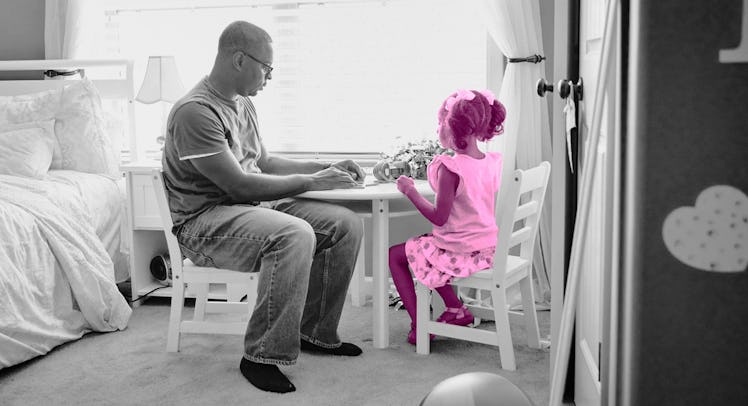How to Speak to a Child About Their Sibling
No parent can really understand their kids' sibling relationships.

Siblings don’t choose each other, but siblings do shape each other. They also exist within a shared political structure, the family, in which they jockey for resources and foment the occasional coup. For parents, this makes it important to remember that kids are not only unique and different from each other but that they are also keenly aware of those differences. Acknowledging that can be really helpful, but it’s important that parents are smart about the way they talk to one of their children about another one of their children. Finesse matters.
Part of the problem is that sibling relationships exist on an experiential plane that parents can’t really fathom. In fact, the parents’ perspective can be deeply out of whack with the sibling reality, according to positive psychologist Dr. Robert Zeitlin, host of the ironically named I’m the Worst Parent Ever podcast. “We all come into this having been kids ourselves and having our own unresolved conflicts,” Zeitlin says. “It’s a classic parenting challenge to find ourselves in a new situation that feels like an old situation and see it as an opportunity to do it better.”
That means that parents who grew up with siblings that were domineering may be less patient with a domineering child. Makes sense. That parent is primed to overreact. But it’s also a bit unfair to punish a child for the sins of his or her uncle or aunt. All the more reason to use the other kid as a reality check.
“It’s a tricky business to insert our understanding, logic, suggestions, and recommendations into the middle of what we don’t always completely understand,” Zeitlin explains. He suggests that parents talk to children about siblings with a huge dose of humility and an even larger dose of curiosity. “Asking questions is key,” he says.
That’s because questions, rather than statements, allow a child to elucidate the intricacies of the sibling relationship. But questions also serve to prompt a kid to think empathetically about their sibling. Because the truth is that parents are simply guessing when they are offering an explanation of the motives behind a sibling’s actions.
One child might complain their brother told them they didn’t care about them, for instance. So instead of a parent saying something like “That’s not true, he loves you deep down inside,” a parent can ask one sibling if they think it’s true that their brother doesn’t care about them, or question what might make the brother say something like that.
How to Talk to a Child About Their Sibling
- Recognize that the relationship between siblings probably isn’t what you think it is.
- Place the past behind you. The relationship with your own siblings isn’t the most useful experience in this situation. These are different people with different needs.
- Ask questions that help a child understand things from their sibling’s point of view.
- Avoid bad mouthing one sibling behind the back (or in front of) the other.
- Don’t excuse the behavior of one sibling by offering interpretations of their motives or abilities.
“There a value to teaching the process of empathy and understanding the world from the other’s point of view,” Zeitlin says. “Asking questions is a way to get there. It’s important to get them to lead with inquiry in their own relationship so that they’re less confrontational and more open to where things might go.”
What’s less helpful is for parents to sympathize so much with the kid in front of them that they start inadvertently tearing down a sibling who isn’t present. Saying, “your sister is being a real jerk,” doesn’t really do anybody any good. The same goes for excusing behavior by pointing out the inadequacies of the sibling by suggesting they have “anger issues” or have a tendency to be “more emotional“ or “aren’t as mature.”
“Speaking ill, or trying to make the child in front of you feel better by categorizing or making generalizations about the other child, may not facilitate them working something out themselves,” Zeitlin explains, adding that obeying the Golden Rule in regards to speaking about others is a pretty solid default mode if you’re struggling to be crafty.
This article was originally published on